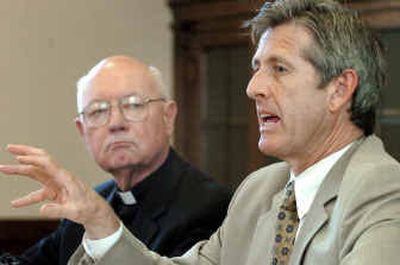Parishes’ ownership key to case

The Roman Catholic Diocese of Spokane and alleged victims of clergy sex abuse are preparing for a legal showdown that could challenge church governance and set a national precedent.
Alleged victims – the creditors in the diocese’s bankruptcy case – have asked a federal bankruptcy judge to declare that parish properties, ranging from the Lady of Lourdes Cathedral to schools and Sunday offerings, belong to the diocese and therefore should be available to settle financial claims.
The diocese’s position is that parish assets are merely held in trust. At a press conference Friday, Bishop William Skylstad insisted that he has no authority to auction or mortgage parish properties.
It’s an issue that cuts to one of the most worrisome questions facing U.S. Catholic churches everywhere: Are parishes protected if their diocese seeks bankruptcy protection?
Catholic dioceses across the nation have been battered by clergy sex abuse scandals. Victims are demanding that churches take responsibility and pay up.
The claims have resulted in multimillion-dollar settlements in dioceses that have ample funds. In others, such as Spokane, it has led to the unusual step of the diocese seeking federal bankruptcy court protection.
Skylstad, who is president of the U.S. Conference of Catholic Bishops, has expressed remorse for the actions of a few priests decades ago while at the same time insisting that parish assets be shielded to preserve the mission of the church.
It remains the core issue in this precedent-setting bankruptcy case. The other two Catholic dioceses that have filed for bankruptcy in response to abuse claims haven’t yet settled the property ownership dispute.
U.S. Bankruptcy Court Judge Patricia Williams will hear arguments on the matter June 27 and could issue a ruling this summer. Victims and the diocese have asked her for summary judgment, a common legal move in which the judge, rather than a jury, decides the outcome of a case.
Though the diocese has about $10 million in cash and property and believes that insurance proceeds of $15 million could be available to pay sex-abuse victims, those numbers pale in comparison with the value of parish assets, which include 81 church buildings, 16 schools, many other properties such as land and houses, and all endowment funds, trusts and charities.
The diocese says it does not know the fair market value of parish assets.
Lawyers familiar with the case say Judge Williams has several options: She could find in favor of victims and greatly boost the value of the diocese estate, or she could rule in favor of the diocese, a decision that may force victims to settle their claims for far less than anticipated.
Also, the judge may decide not to rule and seek further fact-finding by sending the case to trial.
James Stang, an attorney representing abuse victims, has argued in legal briefs that the parishes are “mere instrumentalities of the diocese” and that the operations of both are so entangled that separating them is inconceivable and part of a strategy to keep legitimate assets from creditors.
Diocese attorney Shaun Cross believes all applicable laws are squarely in favor of the diocese, including state trust laws, church laws (also called Canon law), and federal law.
“We feel very strongly about our arguments,” he said.
The sides have not engaged in meaningful settlement talks since before the bankruptcy was filed Dec. 6, illustrating the animosity between them.
Cross said he filed a motion last week calling for the appointment of a mediator.
Earlier Friday, the judge ruled against Stang’s efforts to hire constitutional law expert Marci Hamilton, of Yeshiva University.
As the sides hone their legal strategies, Judge Williams is mindful of the mounting costs. Legal bills are now well above $1 million for the case and growing rapidly as more professionals become involved.
Hamilton, who charges fees of $500 an hour, is considered among the top three experts in First Amendment law, which will be applied in the June 27 hearing. She previously clerked for U.S. Supreme Court Justice Sandra Day O’Connor.
Stang urged the judge to allow Hamilton to take part, arguing that the judge should have the very best information available at her disposal before making such a sweeping decision.
“You deserve and your appellate reviewers deserve the best briefing and argument,” he said.
The judge said no but may allow Hamilton to work on the case for free.
That upset Cross, who said that if victims have such expertise at their disposal, it would put tremendous pressure on the diocese to seek similar expertise. Cross said he was unsure if he could find someone of Hamilton’s stature.